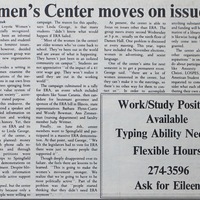The Loyola Phoenix: Women's Center moves on issues
Item
Title
The Loyola Phoenix: Women's Center moves on issues
Description
This article by Connie Jaremczuk discusses the activities of the Loyola Women's Center, which was formally recognized the year before after beginning as an informal group of faculty and students who met to discuss feminist issues.
"The center 'provides a setting in which Loyola women examine the roots and manifestations of the inequities and restrictions in our own lives and the lives of others springing from the dominant sexist value system of present day American society,' according to its officially stated purpose."
Speakers discussed women's ordination and women's labor, and also engaged in activism, especially in support of the Equal Rights Amendment. However, few people outside the group contributed to their dedicated promotion of the ERA. As group member Linda George noted, "Most of the women (in the center) are older women who've come back to school. They've been out in the world and are aware of what is happening. They haven't just been in an isolated community on campus." She also felt that students won't realize how much it will affect the "until they are out in the working world."
The center hell a rally for the ERA and participated in a demonstration in Springfield, but the effort did not succeed, though members felt that the lessons learned would help them strengthen the women's movement.
The Women's Center met every second Wednesday at 3 p.m., usually on the ninth floor of Damen Hall, and would discuss a chosen topic at each meeting, including "the November elections, women in advertising, and sexist language." They hoped to acquire a permanent room at Loyola and to collect a feminist library for members to use, as well as to collaborate with other groups on campus such as "Amnesty International, Pax Christi, LOSPES, and Loyola's Afro-American Student Organization."
LOSPES was the Loyola Organization in Solidarity with the People of El Salvador.
"The center 'provides a setting in which Loyola women examine the roots and manifestations of the inequities and restrictions in our own lives and the lives of others springing from the dominant sexist value system of present day American society,' according to its officially stated purpose."
Speakers discussed women's ordination and women's labor, and also engaged in activism, especially in support of the Equal Rights Amendment. However, few people outside the group contributed to their dedicated promotion of the ERA. As group member Linda George noted, "Most of the women (in the center) are older women who've come back to school. They've been out in the world and are aware of what is happening. They haven't just been in an isolated community on campus." She also felt that students won't realize how much it will affect the "until they are out in the working world."
The center hell a rally for the ERA and participated in a demonstration in Springfield, but the effort did not succeed, though members felt that the lessons learned would help them strengthen the women's movement.
The Women's Center met every second Wednesday at 3 p.m., usually on the ninth floor of Damen Hall, and would discuss a chosen topic at each meeting, including "the November elections, women in advertising, and sexist language." They hoped to acquire a permanent room at Loyola and to collect a feminist library for members to use, as well as to collaborate with other groups on campus such as "Amnesty International, Pax Christi, LOSPES, and Loyola's Afro-American Student Organization."
LOSPES was the Loyola Organization in Solidarity with the People of El Salvador.
Date, date span, or circa acceptable
1983-02-04
File name
The Loyola Phoenix, 1983-02-04, page 10.
Sources archive, University Archives and Special Collections or Women and Leadership Archives
University Archives and Special Collections
Source
University Archives and Special Collections, The Loyola Phoenix, 1983-02-04, page 10.
Subject
Loyola University Chicago
Student life activities
Student life organizations
Student life activism
Rights
Contact the Loyola University Chicago Archives and Special Collections, archive@luc.edu, for permission to copy or publish.

